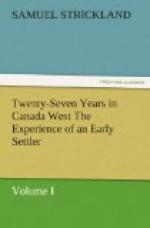The next operation is to cut down all the small trees and brush—this is called under-brushing. The rule is to cut everything close to the ground from the diameter of six inches downwards.
There are two modes of piling, either in heaps or in wind-rows. If your fallow is full of evergreens, such as hemlock, pine, balsam, cedar, and such description of timber, then I should say wind-rows are the best; but when the timber is deciduous, heaps are better.
The brush should be carefully piled and laid all one way, by which means it packs closer and burns better. The regular price for underbrushing hard-wood land, and cutting up-all the old fallen timber--which is always considered a part of the underbrushing—is one dollar per acre, and board. Rough land and swamp vary from seven shillings and sixpence to ten shillings. Your under-brush should be all cut and piled by the end of November, before the snow falls to the depth of four inches, for after that it would be both difficult and tedious.
The chopping now begins, and may be followed without any interruption until the season for sugar-making commences. The heads of the trees should be thrown upon the heaps or wind-rows. A skilful chopper will scarcely ever miss a heap when felling the timber, besides it saves a great deal of labour in piling the limbs.
The trunks of the trees must be cut into lengths, from fourteen to sixteen feet, according to the size of the timber. Now and then a large maple or beech, when felled, may be left without cutting up, with the exception of the top, which is called a plan-heap, and is left to log against: this is only done when the tree is too large to be cut through easily with the axe.
All timber fit for making rails should be left in double and treble lengths, as it is less likely to burn.
A good axe-man should be able, with fair chopping, to cut an acre in eight days after the under-brushing is done. The regular price of chopping is five dollars per acre, with board, or six without.
The emigrant should endeavour to get as much chopping done as possible during the first three years, because after that time he has so many other things to attend to, such as increase of stock, barn and house-building, thrashing, ploughing, &c., which, of course, give him every year less time for chopping, particularly if his family be small, in which case fifty or sixty acres are enough to clear at first, till his boys are old enough to give him assistance.
Clearing up too large a farm, when labour is so high, is not wise, for it will not answer to disburse much for hire, at the present prices. If, therefore, you are not able to cultivate what you have cleared properly, it will grow up again with raspberries, blackberries, small trees, and brush, and be nearly as bad to clear as it was at first.
The size of the farm must, however, depend on the resources of the emigrant, the strength and number of his family, and the quantity of acres he may possess.




